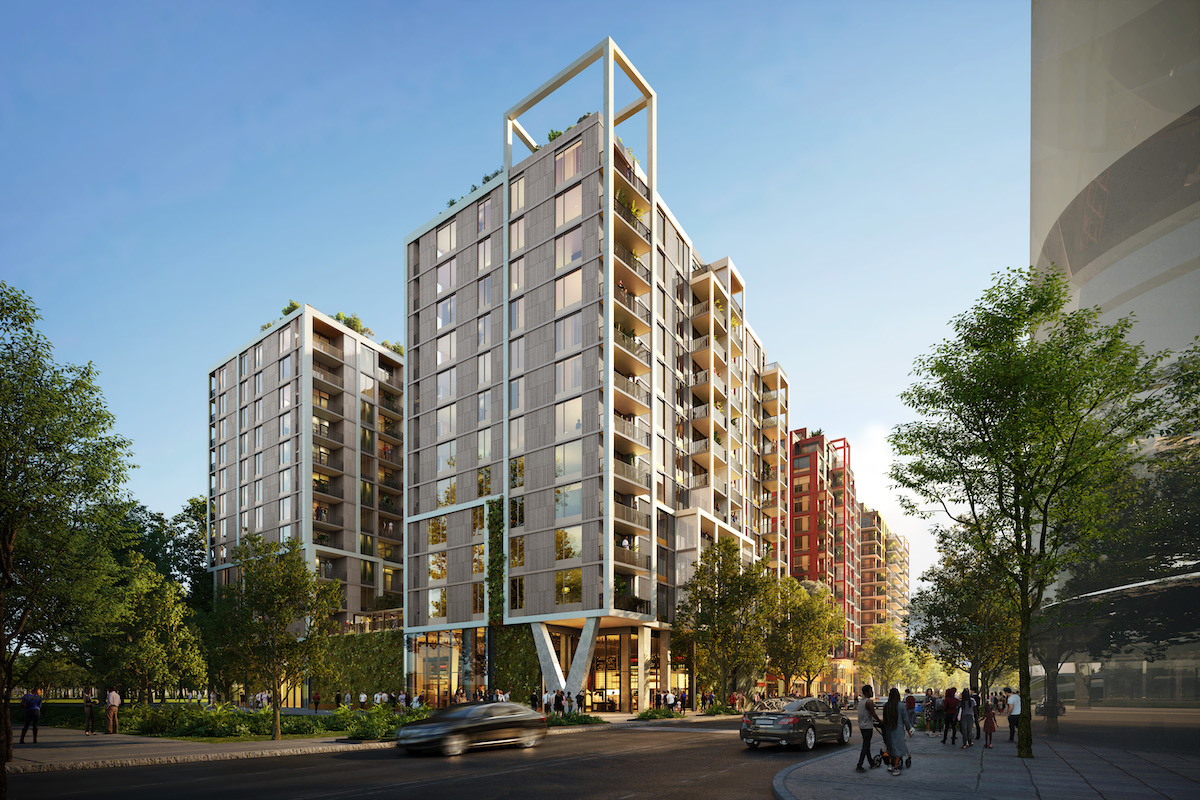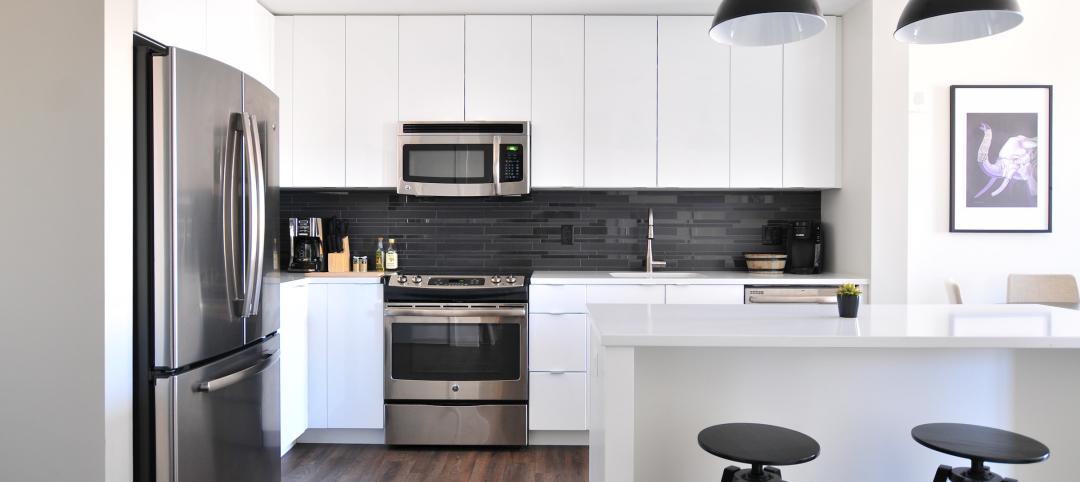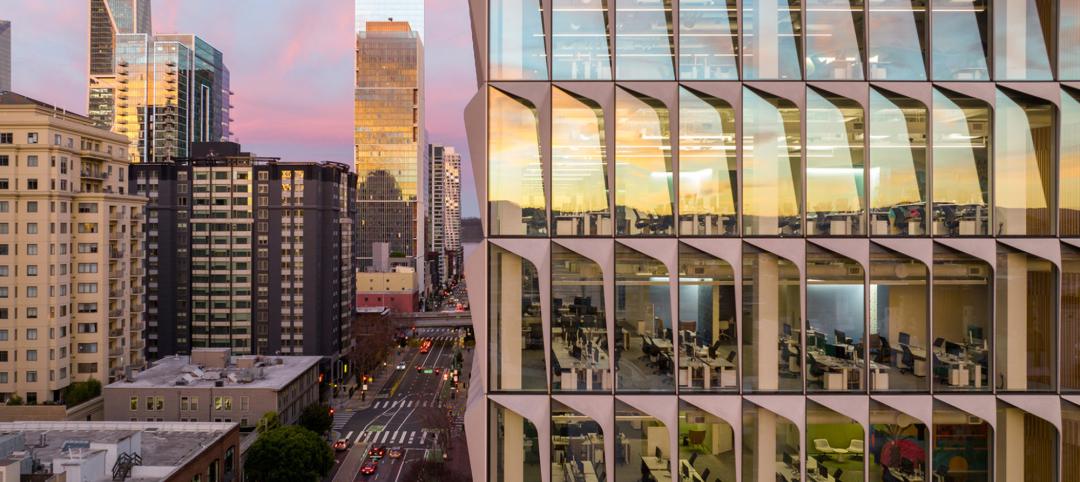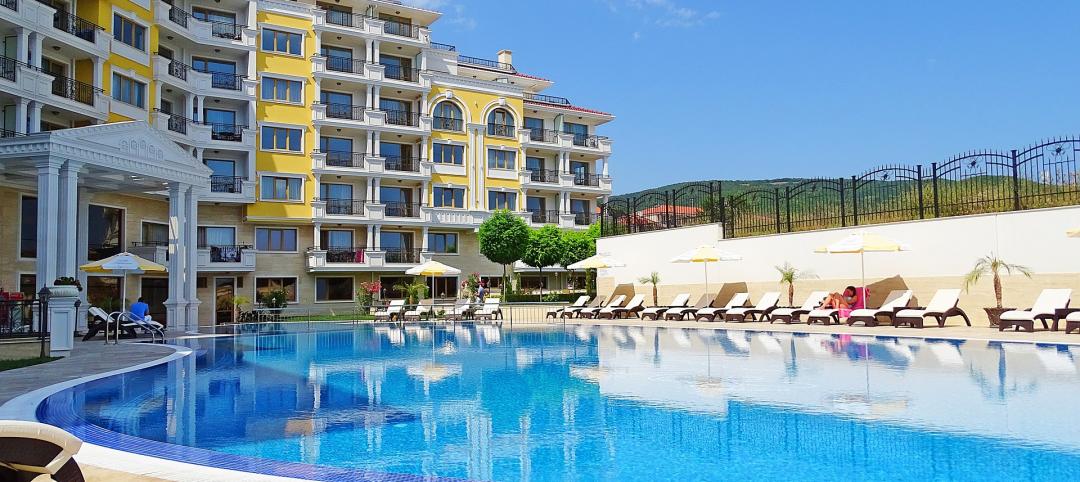The Douglass, the 740,000-sf anchor building of the transformative Bridge District development in Washington, D.C.’s Ward 8, is currently the largest multifamily housing project to pursue Zero Carbon Certification from the International Living Future Institute (ILFI).
The 757-unit building, which started construction in the summer of 2022, will be the first of a series of multifamily and office buildings to be built in the mixed-use development over the next several years.
All power for the building will come from renewable sources, including a 200 kW rooftop solar array capable of producing 200 MWh/yr.
Over 5% of parking spaces will be equipped with EV charging. Another 15% of parking spaces will be “EV ready” for future charging.
The building’s all-electric mechanical system will provide enhanced heating and cooling efficiency via a buildingwide condenser loop, which will transfer energy between residential, retail, and other uses.
“The Douglass represents our region’s largest ground-up development designed to be carbon net zero from operations," said William Passmore, Managing Partner of Redbrick LMD, the developer. "We are pushing the envelope on sustainability with a design that exceeds ILFI and LEED Platinum standards. Sustainable development that promotes human health and well-being and mitigates the impact of climate change is foundational to everything we do."
CONCRETE MIX WILL CUT CO2 EMISSIONS BY 30%
The excavation for the foundation of The Douglass is in its final stages, and the concrete pour is under way. Most of the concrete will be produced by an on-site batch plant. An optimized mix could reduce carbon emissions by 30% compared with traditional mixes. On-site production will reduce or eliminate carbon emissions attributed to transporting concrete to the job site.
Approximately 78 units are designated affordable, defined as at or below 50–60% of median family income in the District of Columbia (currently $129,000 for a family of four), depending on the unit.
The Douglass, designed by ZGF Architects, will offer sweeping views of the Washington, D.C., skyline and Anacostia River. Its proximity to Anacostia Park will provide residents access to greenspace. Ground-floor retail will provide access to shopping, services, and amenities.
BRIDGE DISTRICT – A 2.5 MILLION-SF MIXED-USE DEVELOPMENT OF HOUSING, RETAIL, OFFICE
The Bridge District encompasses approximately eight acres of entitled matter-of-right, mixed-use density in support of nearly 2.5 million square feet planned to be developed into a neighborhood of multifamily apartments, retail, and offices.
Located in the path of growth along the Washington Metro’s Green Line, the Bridge District intends to provide premier work-from-home capabilities, attractive amenities and services for residents and visitors, a health and wellness theme, and access to nature in an urban environment.
All buildings planned for construction at the Bridge District currently target net zero carbon from operations and the highest levels of sustainability that are practically achievable for near-term multifamily development in Washington, D.C.
ABOUT REDBRICK LMD
Redbrick LMD is a community-minded developer, owner, and asset manager of high-impact real estate, helping to create transformative buildings and dynamic urban neighborhoods that reflect how people want to live, work, and play. Headquartered in Washington, D.C., Redbrick has extensive experience and knowledge in developing new projects from the ground up, acquiring and repositioning existing projects, navigating entitlement processes, and structuring real estate transactions to maximize risk-adjusted returns.
Redbrick LMD has developed, redeveloped, and managed more than 5,000 multifamily units nationally across a diverse portfolio of mixed-use assets. Since 2000, the principals have closed more than $2 billion in real estate transactions and are currently managing a development pipeline of approximately 8 million square feet on owned or controlled land.
INTERNATIONAL LIVING FUTURE INSTITUTE
The International Living Future Institute’s mission is to cultivate a socially just, culturally rich, and ecologically restorative society by aiming for regenerative communities, buildings and products rather than incremental improvements, to make progress much faster and in more transformational ways.
Related Stories
Multifamily Housing | Mar 24, 2023
Washington state House passes bill banning single-family zoning
The Washington state House of Representatives recently passed a bill that would legalize duplexes or fourplexes in almost every neighborhood of every city in the state.
Multifamily Housing | Mar 24, 2023
Momentum building for green retrofits in New York City co-ops, condos
Many New York City co-op and condo boards had been resistant to the idea of approving green retrofits and energy-efficiency upgrades, but that reluctance might be in retreat.
Legislation | Mar 24, 2023
New York lawmakers set sights on unsafe lithium-ion batteries used in electric bikes and scooters
Lawmakers in New York City and statewide have moved to quell the growing number of fires caused by lithium-ion batteries used in electric bikes and scooters.
Multifamily Housing | Mar 24, 2023
Multifamily developers offering new car-free projects in car-centric cities
Cities in the South and Southwest have eased zoning rules with parking space mandates in recent years to allow developers to build new housing with less parking.
Multifamily Housing | Mar 24, 2023
Coastal multifamily developers, owners expect huge jump in insurance costs
In Texas and Florida, where Hurricane Ian caused $50 billion in damage last year, insurance costs are nearly 50% higher than in 2022.
Multifamily Housing | Mar 24, 2023
Average size of new apartments dropped sharply in 2022
The average size of new apartments in 2022 dropped sharply in 2022, as tracked by RentCafe. Across the U.S., the average new apartment size was 887 sf, down 30 sf from 2021, which was the largest year-over-year decrease.
Geothermal Technology | Mar 22, 2023
Lendlease secures grants for New York’s largest geothermal residential building
Lendlease and joint venture partner Aware Super, one of Australia’s largest superannuation funds, have acquired $4 million in support from the New York State Energy Research and Development Authority to build a geoexchange system at 1 Java Street in Brooklyn. Once completed, the all-electric property will be the largest residential project in New York State to use a geothermal heat exchange system.
Urban Planning | Mar 16, 2023
Three interconnected solutions for 'saving' urban centers
Gensler Co-CEO Andy Cohen explores how the global pandemic affected city life, and gives three solutions for revitalizing these urban centers.
Building Tech | Mar 14, 2023
Reaping the benefits of offsite construction, with ICC's Ryan Colker
Ryan Colker, VP of Innovation at the International Code Council, discusses how municipal regulations and inspections are keeping up with the expansion of off-site manufacturing for commercial construction. Colker speaks with BD+C's John Caulfield.
Multifamily Housing | Mar 14, 2023
Multifamily housing rent rates remain flat in February 2023
Multifamily housing asking rents remained the same for a second straight month in February 2023, at a national average rate of $1,702, according to the new National Multifamily Report from Yardi Matrix. As the economy continues to adjust in the post-pandemic period, year-over-year growth continued its ongoing decline.

















